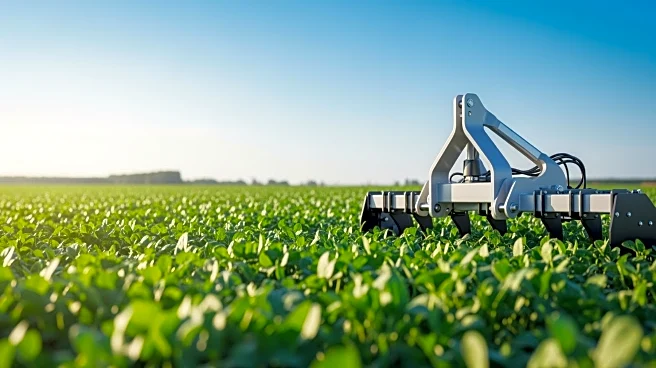What's Happening?
Chris Abbott, CEO of Pivot Bio, is actively participating in the 2025 Norman E. Borlaug International Dialogue, part of the World Food Prize events in Des Moines, Iowa. Abbott joined global leaders in a session titled 'Innovating the Future Now,' focusing
on advancements in food and agriculture. He is also a judge for the inaugural Innovate for Impact Challenge, a competition aimed at supporting tech-driven startups in agriculture. The event attracted 380 global submissions, with three finalists presenting solutions to enhance food security. The dialogue emphasizes the importance of soil health in food security and climate resilience, aligning with Pivot Bio's mission. Dr. Mariangela Hungria, recognized for her work in biological nitrogen fixation, is honored as the 2025 World Food Prize Laureate.
Why It's Important?
The participation of Chris Abbott and Pivot Bio in the World Food Prize Foundation's events underscores the critical role of innovation in agriculture. As global food security becomes increasingly vital, initiatives like the Innovate for Impact Challenge foster technological advancements that can transform agricultural practices. The focus on soil health and microbiology reflects a shift towards sustainable farming methods, reducing reliance on synthetic fertilizers. This has significant implications for global food supply chains, potentially increasing yields and improving environmental outcomes. The recognition of Dr. Hungria's work highlights the importance of scientific research in addressing global food challenges.
What's Next?
The finalists of the Innovate for Impact Challenge will present their projects at the Borlaug Dialogue, with the winner receiving a $50,000 prize. This event could lead to increased investment and interest in agricultural startups, driving further innovation. Pivot Bio's continued involvement in such initiatives suggests ongoing support for sustainable agricultural practices. The outcomes of this dialogue may influence future policies and funding priorities in the agricultural sector, promoting technologies that enhance food security and environmental sustainability.
Beyond the Headlines
The emphasis on soil health and microbiology in agriculture could lead to long-term shifts in farming practices, promoting more sustainable and resilient food systems. This focus may also drive regulatory changes, encouraging the adoption of environmentally friendly technologies. The collaboration between global leaders and innovators at the World Food Prize events highlights the potential for international cooperation in addressing food security challenges. As these technologies develop, they could reshape agricultural landscapes, impacting economies and societies worldwide.

















